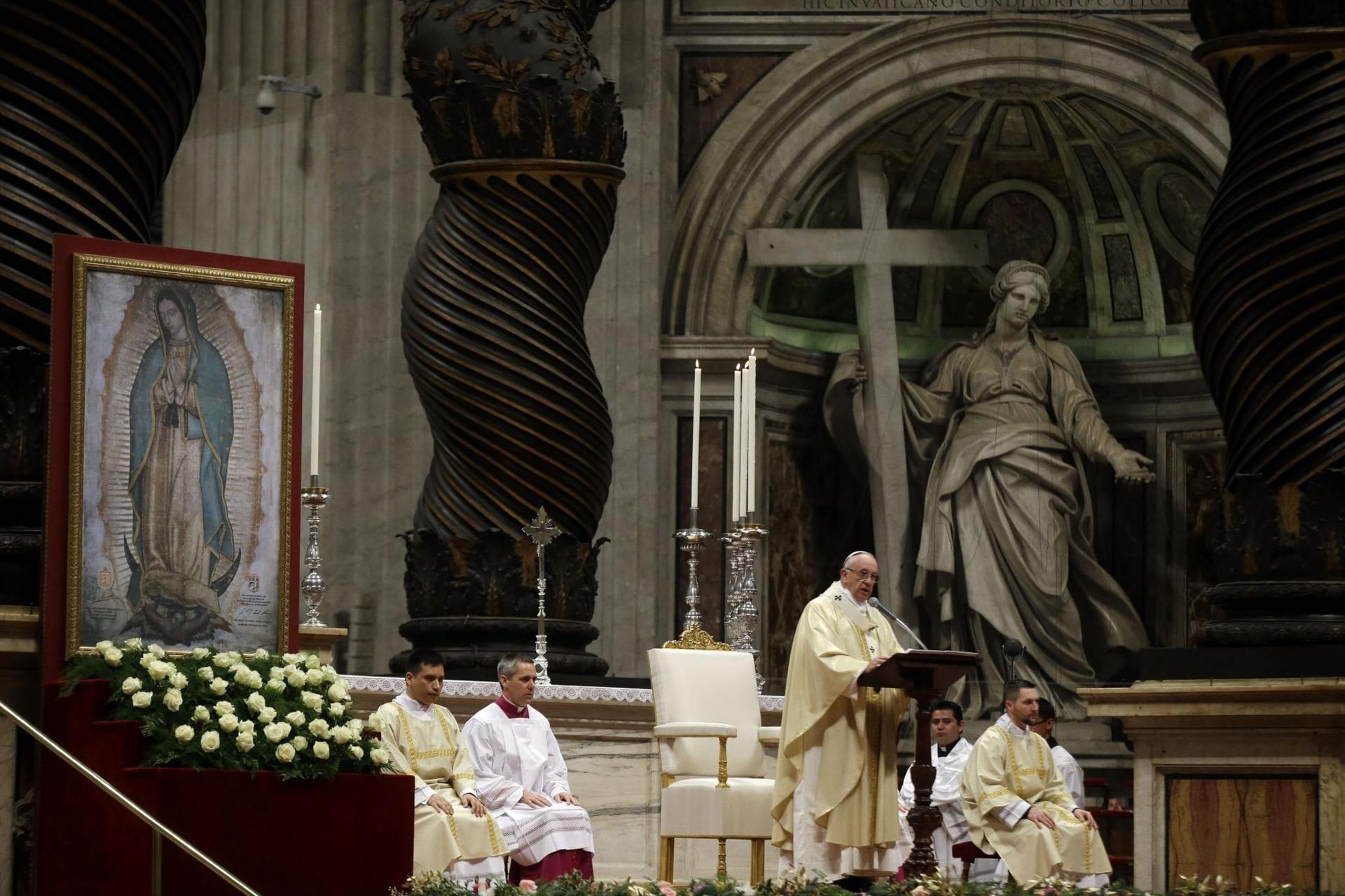ROME — Pope Francis on Saturday confirmed that he will travel to Mexico, a trip that will include a stop in Ciudad Juarez on the border with the United States in order to make a statement about immigrant rights, in mid-February.
The pontiff said he will visit the Shrine of Our Lady of Guadalupe in Mexico City, the main reason for his trip, on Feb. 13.
The confirmation came as Francis was celebrating a Mass for the feast of Our Lady of Guadalupe, patroness of the Americas, in Rome’s St. Peter’s Basilica.
Francis said in his homily for the Mass that he entrusts the sufferings and joys of the American people to the Madonna of Guadalupe.
“To her we ask that this jubilee year becomes a sowing of merciful love in the heart of the people, families, and nations,” he said. “That we become merciful, and that the Christian communities learn to be an oasis and a source of mercy.”
“To as for all this, I will travel to venerate her in her shrine next Feb. 13,” the pope said.
Soon after the Mass ended, the Vatican released the full program for the Feb. 12-17 visit to Mexico. It will include visits to the Mexico DF (or Distrito Federal, the official name for Mexico City), San Cristóbal de las Casas, close to the southern border with Guatemala, Morelia, and also Ciudad Juarez, next to the US border.
The stop in Ciudad Juarez is expected to provide the pontiff a platform to repeat his support for immigrant rights, and will come as voters in the United States are heading to the polls in both Iowa and New Hampshire.
Each visit will be a one-day trip, always going back to the capital to spend the night before moving on to a different city.
Francis will arrive to the capital city on Feb. 12. The welcoming ceremony will be on the next day, before celebrating a Mass at the Shrine of Our Lady of Guadalupe. On Feb. 14, he’ll celebrate a Mass at a local university, expected to draw over 300,000 people.
In Catholic circles, San Cristóbal de las Casas is known as the diocese of the late Bishop Samuel Ruiz Garcia, who died in 2000. His embrace of liberation theology and advocacy of causes of indigenous people sometimes made him a controversial figure. He remained in office despite a request from the Vatican in 1993 to step down on the grounds of having polarized the Church.
Francis will take a day trip to the city on Feb. 15. His day will focus mostly on the local indigenous community, as he’ll celebrate a Mass for them and then have lunch with representatives of this community. After lunch, he’ll have an encounter with families at a stadium.
Morelia is currently considered among the most dangerous cities in Mexico, as a result of drug trafficking and organized crim. It’s also the diocese of Cardinal Alberto Suarez Inda, who had requested his episcopal resignation two years ago, after reaching the age of 75. Francis had asked him to wait until he could find a replacement, but instead created him a cardinal in February.
Francis will visit Morelia on Feb. 16, and he’ll celebrate a Mass with the local religious community and meet the youth.
The last stop will be in Ciudad Juárez, where he’ll have an encounter with the working class and celebrate a Mass, the fifth and last of his visit.
Boston’s Cardinal Sean P. O’Malley, who was at St. Peter’s Basilica this Saturday, told Crux he’s planning on joining the pope in Mexico during his final day. The prelate was among those who insisted on Francis going to the border.
As he flies out of Mexico, the pope’s plane could cross into American airspace. When he announced his visit to the US for last September, he said he wanted to come into the country from Juárez to make a point regarding immigration. It wasn’t possible for logistical reasons, but it could be done this time.
When referring to the trip last month, Francis said that his idea in choosing the cities was to visit places no pope had ever gone to, beyond the mandatory visit to the capital to visit the Virgin Mary.
This will be Francis’ 12th international trip and the third to his home continent. The previous trips to Latin America included Brazil in 2013 and Bolivia, Ecuador, and Paraguay in July.















